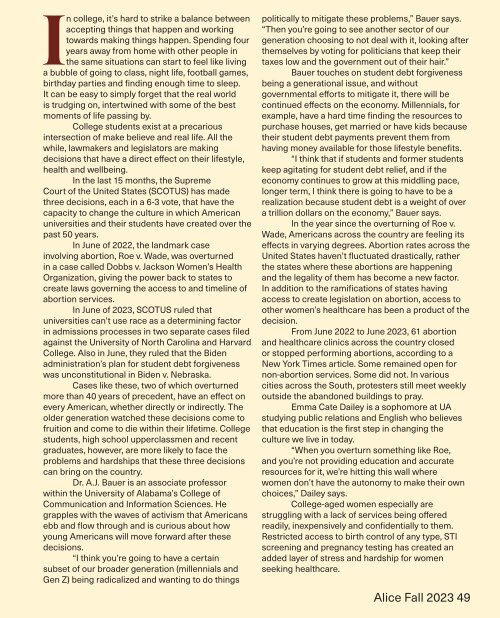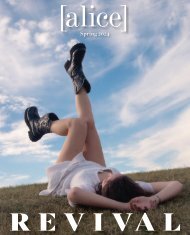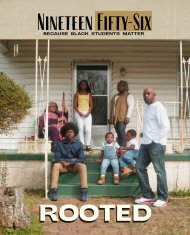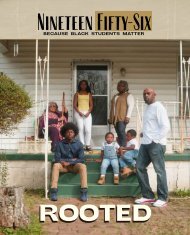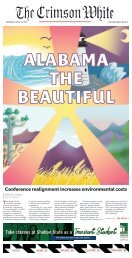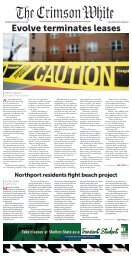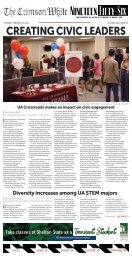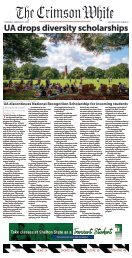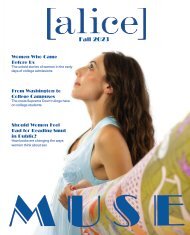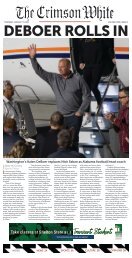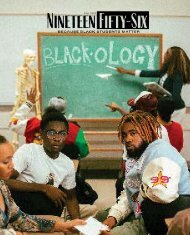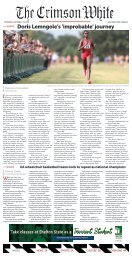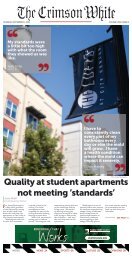Volume 9 Issue 1
The first issue of Volume 9 spotlights women, both past and present, who are leaving their mark through creativity. From historical women who blazed trails before us, to Supreme Court decisions that shape the lives of college students, and even the unapologetic act of reading smut in public spaces. Volume 9 Issue 1 is a tapestry that weaves together the threads of the past, present, and future, celebrating the power of artistic expression to provoke thought, challenge norms and ignite change.
The first issue of Volume 9 spotlights women, both past and present, who are leaving their mark through creativity. From historical women who blazed trails before us, to Supreme Court decisions that shape the lives of college students, and even the unapologetic act of reading smut in public spaces. Volume 9 Issue 1 is a tapestry that weaves together the threads of the past, present, and future, celebrating the power of artistic expression to provoke thought, challenge norms and ignite change.
Create successful ePaper yourself
Turn your PDF publications into a flip-book with our unique Google optimized e-Paper software.
In college, it’s hard to strike a balance between<br />
accepting things that happen and working<br />
towards making things happen. Spending four<br />
years away from home with other people in<br />
the same situations can start to feel like living<br />
a bubble of going to class, night life, football games,<br />
birthday parties and finding enough time to sleep.<br />
It can be easy to simply forget that the real world<br />
is trudging on, intertwined with some of the best<br />
moments of life passing by.<br />
College students exist at a precarious<br />
intersection of make believe and real life. All the<br />
while, lawmakers and legislators are making<br />
decisions that have a direct effect on their lifestyle,<br />
health and wellbeing.<br />
In the last 15 months, the Supreme<br />
Court of the United States (SCOTUS) has made<br />
three decisions, each in a 6-3 vote, that have the<br />
capacity to change the culture in which American<br />
universities and their students have created over the<br />
past 50 years.<br />
In June of 2022, the landmark case<br />
involving abortion, Roe v. Wade, was overturned<br />
in a case called Dobbs v. Jackson Women’s Health<br />
Organization, giving the power back to states to<br />
create laws governing the access to and timeline of<br />
abortion services.<br />
In June of 2023, SCOTUS ruled that<br />
universities can’t use race as a determining factor<br />
in admissions processes in two separate cases filed<br />
against the University of North Carolina and Harvard<br />
College. Also in June, they ruled that the Biden<br />
administration’s plan for student debt forgiveness<br />
was unconstitutional in Biden v. Nebraska.<br />
Cases like these, two of which overturned<br />
more than 40 years of precedent, have an effect on<br />
every American, whether directly or indirectly. The<br />
older generation watched these decisions come to<br />
fruition and come to die within their lifetime. College<br />
students, high school upperclassmen and recent<br />
graduates, however, are more likely to face the<br />
problems and hardships that these three decisions<br />
can bring on the country.<br />
Dr. A.J. Bauer is an associate professor<br />
within the University of Alabama’s College of<br />
Communication and Information Sciences. He<br />
grapples with the waves of activism that Americans<br />
ebb and flow through and is curious about how<br />
young Americans will move forward after these<br />
decisions.<br />
“I think you’re going to have a certain<br />
subset of our broader generation (millennials and<br />
Gen Z) being radicalized and wanting to do things<br />
politically to mitigate these problems,” Bauer says.<br />
“Then you’re going to see another sector of our<br />
generation choosing to not deal with it, looking after<br />
themselves by voting for politicians that keep their<br />
taxes low and the government out of their hair.”<br />
Bauer touches on student debt forgiveness<br />
being a generational issue, and without<br />
governmental efforts to mitigate it, there will be<br />
continued effects on the economy. Millennials, for<br />
example, have a hard time finding the resources to<br />
purchase houses, get married or have kids because<br />
their student debt payments prevent them from<br />
having money available for those lifestyle benefits.<br />
“I think that if students and former students<br />
keep agitating for student debt relief, and if the<br />
economy continues to grow at this middling pace,<br />
longer term, I think there is going to have to be a<br />
realization because student debt is a weight of over<br />
a trillion dollars on the economy,” Bauer says.<br />
In the year since the overturning of Roe v.<br />
Wade, Americans across the country are feeling its<br />
effects in varying degrees. Abortion rates across the<br />
United States haven’t fluctuated drastically, rather<br />
the states where these abortions are happening<br />
and the legality of them has become a new factor.<br />
In addition to the ramifications of states having<br />
access to create legislation on abortion, access to<br />
other women’s healthcare has been a product of the<br />
decision.<br />
From June 2022 to June 2023, 61 abortion<br />
and healthcare clinics across the country closed<br />
or stopped performing abortions, according to a<br />
New York Times article. Some remained open for<br />
non-abortion services. Some did not. In various<br />
cities across the South, protesters still meet weekly<br />
outside the abandoned buildings to pray.<br />
Emma Cate Dailey is a sophomore at UA<br />
studying public relations and English who believes<br />
that education is the first step in changing the<br />
culture we live in today.<br />
“When you overturn something like Roe,<br />
and you’re not providing education and accurate<br />
resources for it, we’re hitting this wall where<br />
women don’t have the autonomy to make their own<br />
choices,” Dailey says.<br />
College-aged women especially are<br />
struggling with a lack of services being offered<br />
readily, inexpensively and confidentially to them.<br />
Restricted access to birth control of any type, STI<br />
screening and pregnancy testing has created an<br />
added layer of stress and hardship for women<br />
seeking healthcare.<br />
Alice Fall 2023 49


